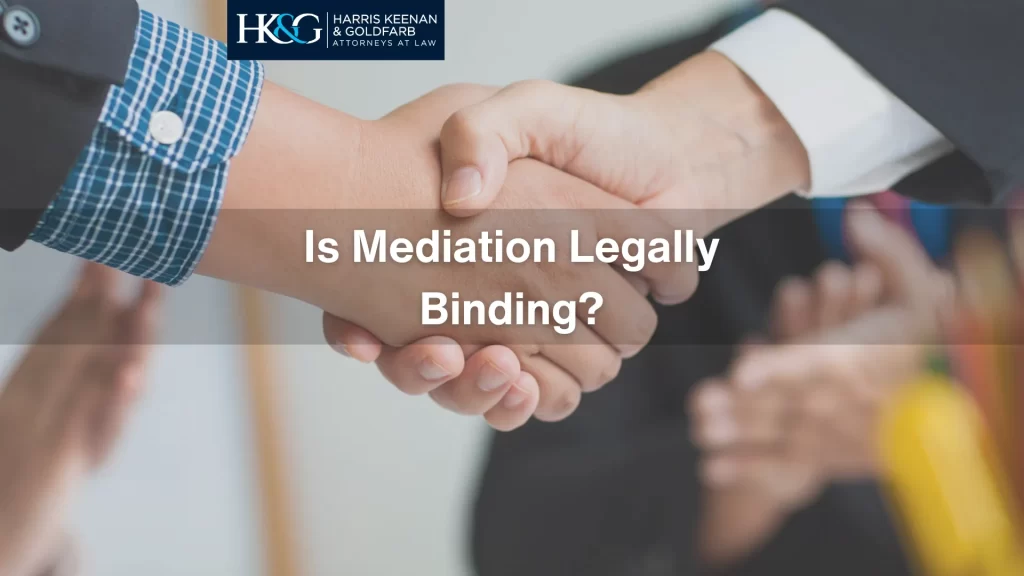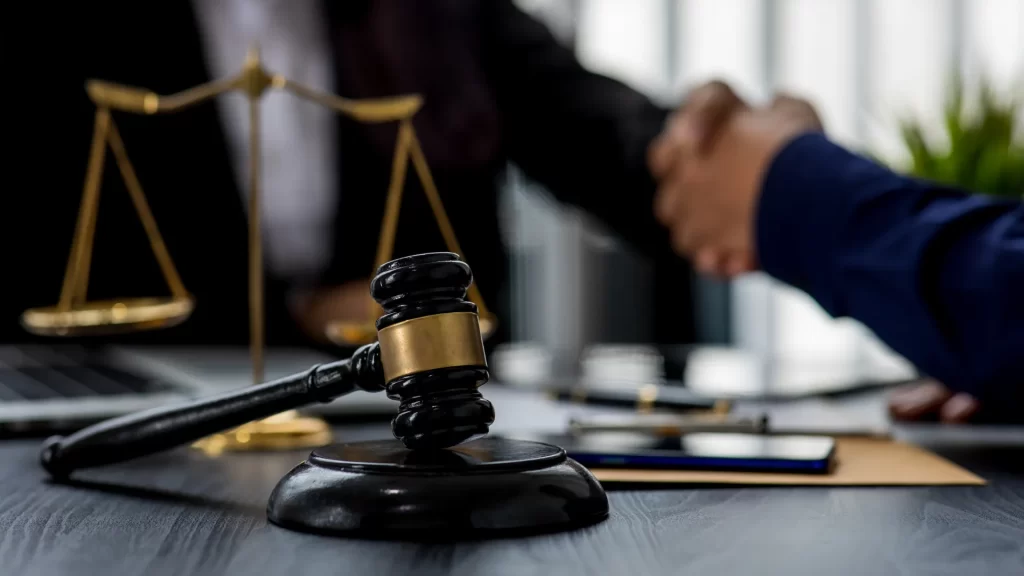A Brooklyn jury awarded Mr. Vargas $17.5 million for the City of New York’s violation of his civil rights for failing to provide him medical care while in custody. The jury found that the police officers involved failed to provide the necessary medical treatment and awarded $17.5 million to Mr. Vargas.
Recommended Articles
Practice Areas
Get A Free Case Evaluation
Is Mediation Legally Binding?

It’s important to understand the entire mediation process when you enter into mediation for your personal injury case. Many of our clients ask us, “Is mediation legally binding?” That depends on whether the parties involved signed a settlement agreement due to the mediation.
Having an attorney with you is best if you’re participating in a mediation session for your personal injury case. Our NYC personal injury lawyers can help you focus on your goals in mediation and assist in negotiating a fair settlement.
When Does Mediation Become Binding?
Mediation is an alternative dispute resolution method that consists of guided negotiations overseen by a trained mediator. The role of the mediator is to help the parties reach a mutually agreeable settlement without going to court.
Mediation is less formal than civil court, and the rules of evidence are looser. You may be able to talk more openly about your feelings and concerns. All parties sign a confidentiality agreement before the start of the session. A mediator can help the negotiation remain focused on the issues at hand. They will prevent it from getting out of control if one or both parties get emotional or start arguing about blame.
If a judge orders you and the other party to mediation, you must participate or risk violating a court order. However, many parties voluntarily agree to mediation. Because mediation is not mandatory in personal injury cases in New York. You and the defendant can attempt to settle your claim through mediation before the trial.
Arbitration, another alternative dispute resolution process, results in binding decisions made by the arbitrator. In mediation, on the other hand, the mediator issues no judgments or decisions. Their goal is to facilitate settlement discussions. Mediation itself is not binding. But if a settlement agreement is reached and the parties sign a document outlining the agreement, that agreement is usually binding.
What Is the Difference Between Mediation and a Settlement?
Settlement negotiations don’t have to go through mediation. When mediation is not involved, the parties in a case – or, more often, their lawyers – may go back and forth to achieve a compromise. If your lawyer gets a settlement agreement in writing, it becomes legally binding once a judge approves and signs it, thus concluding your case.
If you reach a mediated settlement agreement, and it’s in writing, that document is likely legally binding if it meets the legal requirements for a contract. A mediated settlement agreement is presented to a judge for approval. The document is binding once the judge signs it, and your case is closed.
If the other party does not comply with the signed, judge-approved agreement, you can pursue a breach of contract action in court.
Possible Outcomes of Mediation
Mediation can have multiple outcomes. These range from getting everything you want to the parties unable to agree. When that happens, the case must go to trial.
Mediation allows you to find creative solutions to your dispute. A compromise could involve the defense accepting responsibility for what happened but offering a lower settlement amount.
Mediation is confidential. That means that both parties agree whatever is said can’t be used at trial. This freedom to speak and the more relaxed nature of mediation can make the dispute resolution process less contentious.
Confidentiality in mediation can also extend to the agreement itself. One party may stipulate non-disclosure of the case, from how your injuries were caused to the settlement amount. This is common in medical malpractice cases where a healthcare facility doesn’t want a damaged reputation. It’s also common in defective products or dangerous drug cases when the defendant doesn’t want news of consumer injury getting out. In a trial, everything becomes public record, from a company’s negligence to how much they were sued for and ordered to pay.
Do I Have to Make an Agreement in Mediation?
Even if you’re court-ordered to participate in mediation, that doesn’t mean you must walk out with a mediated settlement agreement. Mediation gives you control over the outcome of the dispute. But you aren’t required to reach an agreement.
In some cases, the facts could be unclear, even after both sides go through discovery and depose witnesses. You may not have a lot of indisputable facts to support your claim. So the other side may not feel compelled to admit they were negligent and settle.
Perhaps your lawyer believes the other party should pay punitive damages only available in a court proceeding. Punitive damages are assessed in cases where the defendant’s actions were egregiously negligent. They serve to punish the defendant and set an example to other similar parties who may be tempted to engage in similar actions. This could, for example, include cases where a drug manufacturer released a medication that hadn’t been fully tested or was known to have dangerous side effects.
You may be able to recover more if you take your case to trial than you would if you negotiated a settlement in mediation. It’s not guaranteed, though. This is also a reason why it’s important to have an experienced NYC personal injury lawyer advising you of the strength of your case and possible outcomes if you go to trial.
Do I Need a Lawyer for Mediation?

You are not required to have a lawyer to represent you in mediation. However, many people feel more comfortable with their legal advocate beside them. Negotiations in mediation may become emotional. This is especially true if you’re still reeling from the pain of your injuries or the trauma of the accident. You may be able to ask your lawyer to speak for you if you become overwhelmed.
Some people may feel uncomfortable negotiating. Our personal injury lawyers are trained negotiators. We have experience with even the most complex personal injury cases. Your attorney may be able to negotiate better terms for the settlement than you could alone.
Contact Our New York City Personal Injury Lawyers About Your Case Today
Have you been injured by a negligent party and wish to seek compensation? Have you been asked to attend mediation with the defendant in your personal injury claim? We can help you pursue the best possible outcome for your case and prepare you for the mediation session. Contact Harris Keenan & Goldfarb at 1-800-PAIN-LAW for a free consultation today.
Related Posts
What Happens After a Deposition?
All About Depositions in a Personal Injury Lawsuit
Over $500 Million in Verdicts and Settlements
Our track record showcases over $500 million won for our clients. Each victory underlines our commitment to justice and client care. Explore our impact, case by case.
What Our Clients Say About Us

Frequently Asked Questions
Common questions that prospective clients have about personal injury claims include:
Do I need an attorney?
When you have suffered an injury, it can be difficult to know what to do next. If the injury was caused by someone else’s negligence, you may be entitled to compensation. However, filing a personal injury claim can be a complex and time-consuming process. An experienced attorney can help you navigate the legal system and fight for the maximum possible compensation.
How do I know I have a case?
When should I contact an attorney?
How do I determine which one to choose?
Once I hire an attorney, what should I expect?
Recent News
Find out how to move forward after an unexpected event with our short, helpful articles. We share simple advice that can make a big difference in tough times.
Contact Us
Monday - Friday: 9am - 6pm














